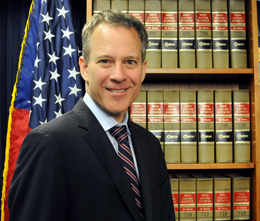 As part of a wider investigation into deceptive advertising and sales practices allegedly used by the direct marketing industry, Attorney General Eric T. Schneiderman today announced settlements with Tristar Products, Inc. (“Tristar”), a firm headquartered in Fairfield, New Jersey, and Product Trend, LLC (“Product Trend”), headquartered in Williston, Vermont.
As part of a wider investigation into deceptive advertising and sales practices allegedly used by the direct marketing industry, Attorney General Eric T. Schneiderman today announced settlements with Tristar Products, Inc. (“Tristar”), a firm headquartered in Fairfield, New Jersey, and Product Trend, LLC (“Product Trend”), headquartered in Williston, Vermont.
The agreements require the direct marketers to make significant reforms to their advertising, ordering processes and customer service practices. The marketers sell their products directly to consumers, typically through television and online advertising.
Tristar’s products include Genie Bra; blenders and juicers, as well as a variety of exercise equipment, such as the Ab Coaster and Cardio Twister. Product Trend’s products include Total Pillow, Wonderhanger and Furniture Fix.
The agreements also require each marketer to make a monetary payment to the New York Attorney General’s Office for restitution, penalties, costs and fees, with Tristar paying $700,000 and Product Trend paying $175,000.
“These agreements insure that consumers will not be hit with charges they did not authorize and will not be frustrated with long hold times or unresponsive customer service when they seek assistance,” Attorney General Schneiderman said. “The settlements also bring much needed reforms to two major players in the direct marketing industry and insure that consumers will have a clear understanding of the charges before they place an order.”
The Attorney General’s Consumer Frauds Bureau launched a probe into the industry after receiving complaints from consumers, including hundreds forwarded by the Better Business Bureau.
According to the Attorney General’s investigation, both marketers ran misleading infomercials on television that often featured attractively priced “Buy One, Get One” offers, which required consumers to purchase a double order of the advertised product. However, the ads did not adequately disclose that consumers would be charged two separate processing and handling fees or the amount of those fees, which significantly increased the cost of the offer.
When consumers placed orders by phone or online, they were subjected to a confusing, automated ordering process that typically included numerous “upsell” offers for additional products.
Consumers were also not given the opportunity to review and edit their orders before they were processed. As a result, in some cases, consumers who responded to the marketers’ advertisements were charged significantly more than they expected and received products that they did not intend to order.
One Product Trend customer responded to a “Buy One, Get One” ad for Total Pillow, advertised for $19.99, plus shipping and handling, but was charged $91.73 after placing an order online. A Tristar customer who responded to a $19.99 “Buy 3, get 3” Genie Bra advertisement ended up being charged $101.83. Although she subsequently returned the bras, Tristar refused to refund the $27.00 charged for shipping and handling.
The Attorney General’s investigation also revealed that consumers who sought warranty service from Tristar for products that malfunctioned or to obtain authorization to return products often faced long telephone hold times and otherwise had difficulty obtaining relief or assistance.
The settlements require the marketers to:
- Clearly and conspicuously disclose all material terms of an advertised offer.
- Clearly and conspicuously disclose the amount of any processing and handling fee for the second item in a “Buy One, Get One” offer.
- Provide consumers with an opportunity to confirm the details and the total price of any order before it is processed. For orders placed online, this includes presenting the consumers with a checkout or shopping cart page that the consumer can edit.
- Disclose the amount of any processing and handling fees during the ordering process before the consumer is asked to confirm the order details.
- Label all hyperlinks to clearly convey the consequence of clicking the link.
- Email consumers who place orders by phone an order summary with any processing, handling or other charges.
- Ensure that the marketers’ customer service lines are adequately staffed so that consumers are not subjected to long hold times.
In March 2015, the Attorney General and Federal Trade Commission reached a similar settlement with Allstar Marketing Group, LLC located in Hawthorne, New York.
Consumers who believe they may be entitled to a refund should notify the Attorney General’s office. Consumers can file a complaint online or obtain a complaint form at www.ag.ny.gov. Consumers can also call the Attorney General’s consumer helpline at 1-800-771-7755. This investigation is being handled by Assistant Attorney General Amy Schallop, Deputy Bureau Chief Laura J. Levine and Bureau Chief Jane M. Azia, all of the Consumer Frauds and Protection Bureau, and Executive Deputy Attorney General Manisha M. Sheth.

